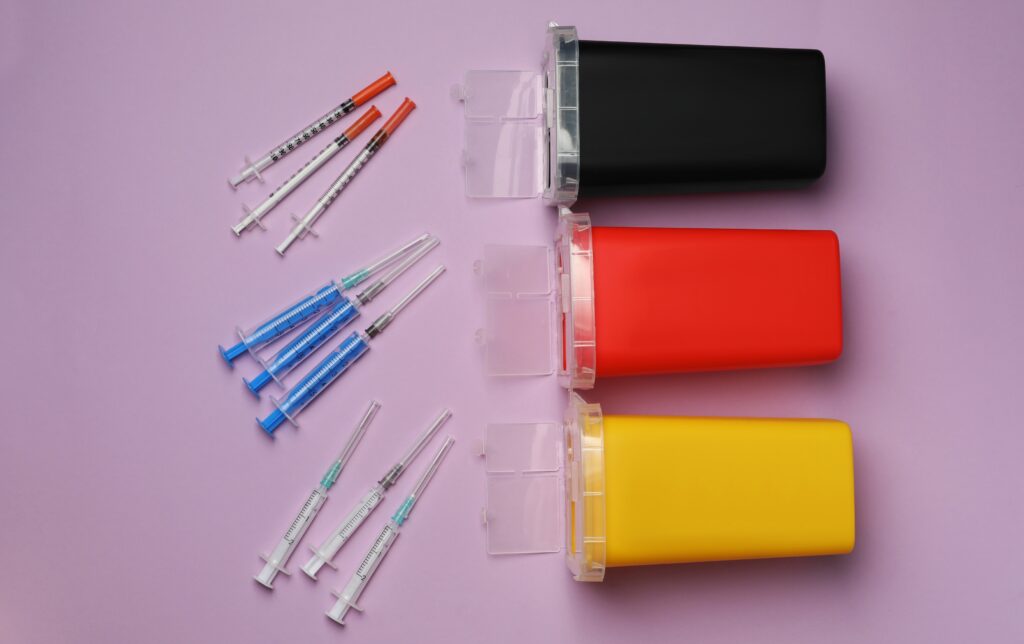Sharps must be appropriately disposed of in healthcare settings to avoid transmission of bloodborne pathogens and protect workers.
It is essential to follow fundamental principles and best practices:
Segregation:
They should immediately segregate and place sharps not easily handled in puncture-resistant, leak-proof sharps containers. Also, this way, they can prevent accidental injuries and ensure appropriate sharps containment.
Accessible Sharps Disposal:
Sharps containers should be conveniently located within easy reach of healthcare workers, minimizing the risk of improper disposal. This accessibility promotes a safer working environment and encourages proper sharps handling.
Avoid Recapping Needles:
Recapping needles, a common practice among healthcare workers, increases the risk of accidental needle sticks. Avoiding unnecessary recapping and utilizing safety mechanisms built into the disposal containers is essential to prevent injuries.
Prompt Disposal:
You should promptly and appropriately dispose of sharp objects in designated biomedical waste containers. Prevent injuries and contamination.
Training and Education:
All healthcare workers should receive proper training and education on sharps safety procedures. Healthcare workers must use PPE, handle materials safely, and dispose of them properly to protect themselves and colleagues.
Regular Audits and Reviews:
Regular audits and reviews of sharps handling practices help identify any gaps in safety protocols. By addressing these gaps, surgery centers can continuously improve their sharps safety measures, ensuring the well-being of their staff.
Proper sharps disposal procedures are of utmost importance:
Select Appropriate Sharps Containers:
Utilize sharps containers that are puncture-resistant and leak-proof, with self-closing lids. These containers mitigate the risk of spills and protect against accidental needle sticks.
Proper Placement of Sharps:
Sharps should be placed directly into the container without touching the needle or sharp end. It minimizes the risk of accidental injuries during disposal.
Avoid Overfilling Sharps Containers:
Sharps containers should be fresh. Replace them when they are two-thirds full or as the manufacturer instructs. Overfilled containers increase the likelihood of injuries and spills.
Secure Disposal of Sharps Containers:
Once a sharps container is full or reaches the manufacturer’s recommended fill level, it should be securely sealed and disposed of as medical waste. Ensure that your facility follows local regulations and guidelines for sharps disposal.
Implementing additional sharps safety measures in surgery centers can further enhance worker protection:
Two-handed Technique:
Adopt the two-handed technique for passing sharps. It involves using one hand to hold the sharp end while the other stabilizes the patient or object. This technique minimizes the risk of accidental injuries during the transfer of sharps.
Use of Blunt-tip Needles:
Whenever possible, consider using blunt-tip needles. Blunt-tip needles have a lower risk of causing accidental needle sticks, providing an added layer of safety.
Needleless Systems:
Consider needleless systems for drug administration and blood collection when appropriate. These systems eliminate the risks associated with traditional needles.
Personal Protective Equipment (PPE):
Proper PPE, including gloves and gowns, should always be worn when handling and disposing of sharps. PPE is a vital barrier that protects healthcare workers from potential exposures.
Sharps Incident Reporting:
Encourage the reporting of all sharps injuries, regardless of severity. By fostering a culture of reporting, surgery centers can identify patterns, investigate incidents, and implement improvements to prevent future injuries.
In conclusion, sharps safety is of paramount importance in surgery centers. Implementing a comprehensive approach that encompasses proper sharps handling, disposal, training, and ongoing evaluation of safety protocols is essential. By adhering to best practices, surgery centers can create a safer working environment, protect healthcare workers from sharps injuries, and prevent the transmission of bloodborne pathogens. Together, we can ensure the well-being of our valuable healthcare professionals.



